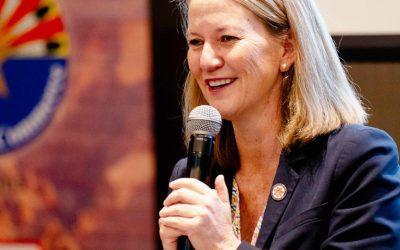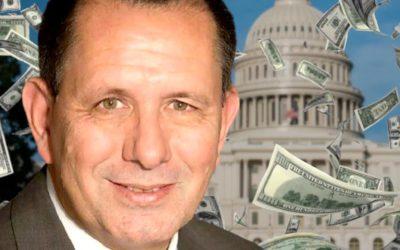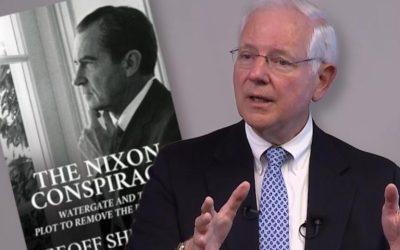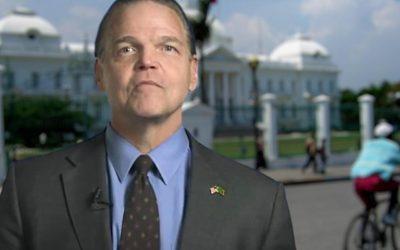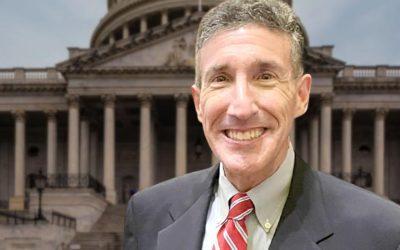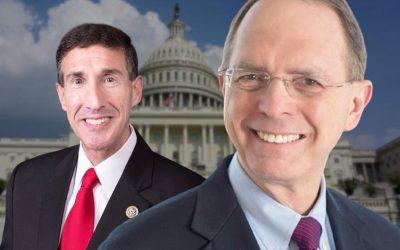Rachel Alexander, lead reporter at The Arizona Sun Times, said Arizona Attorney General Kris Mayes’ announcement that the State Grand Jury returned indictments to those who agreed to serve as a slate of alternate electors for Donald Trump had he won the 2020 election is “deliberate.”
NewsChannel 5’s Phil Williams Responds with Deceptive Distractions When Confronted Over His Journalistic Failures to Get Justin Jones on the Record Over 2020 Claim
NewsChannel 5’s chief investigative reporter Phil Williams continues to be criticized for his “journalistic failures” as he dodged an opportunity to confront State Representative Justin Jones (D-Nashville) on his alleged coverup of a 2020 assault of two protesters by a homeless man.
Roger Simon on Pro-Hamas, Anti-Israel Protests on College Campuses: ‘What Happened in Germany in 1937’ Is ‘What We’re Undergoing Now’
Roger Simon, the co-founder of PJMedia and current columnist for The Epoch Times, said the pro-Hamas protests unfolding on Ivy League college campuses across the nation are comparable to the scene in Germany in 1937.
Simon made the comments on Tuesday’s episode of The Michael Patrick Leahy Show after listening to audio of a clip taken from Columbia University where pro-Palestine protesters formed a human chain to keep Jewish students out of an encampment on the university’s campus.
NewsChannel 5’s Phil Williams Refuses to Explain His Failure to Get Justin Jones on the Record about Allegations He Covered Up Report of 2020 Sexual Assault, Tries to Distract with False Claims About Tennessee Star Reporter
Tom Pappert, lead reporter at The Tennessee Star, addressed personal attacks from NewsChannel 5’s chief investigative reporter Phil Williams over the weekend, saying such attacks are “absolute silliness” and a common tactic used by Williams when pressed on his “journalistic failings.”
On Sunday, Pappert reported on an interview between Williams and Dan Mandis, host of Nashville’s Morning News with Dan Mandis on SuperTalk 99.7 WTN, where Williams said that he once asked Tennessee State Representative Justin Jones (D-Nashville) to respond to claims made by his former close colleague Jeneisha Harris on June 18, 2020 that the state lawmaker had covered up the sexual assault of two protesters by a homeless man.
Ben Cunningham Calls Nashville Mayor’s $3.1 Billion Transit Referendum ‘Absurd’
Ben Cunningham, founder of the Nashville Tea Party, said not only does Nashville Mayor Freddie O’Connell’s transit referendum appear to be illegal under the IMPROVE Act, but the transit plan’s overall vision of commuters suddenly switching over to public transport is “absurd.”
O’Connell unveiled his $3.1 billion transit plan, called “Choose How You Move: An All-Access Pass to Sidewalks, Signals, Service, and Safety,” last week, which would be funded through a half-cent increase in the city’s sales tax.
Neil W. McCabe: Trump Has Opportunity to Capitalize in New York, Produce ‘Amazing Turnout’ for Republicans in November
National political reporter Neil W. McCabe said the scene of former President Donald Trump visiting a bodega in West Harlem last week “absolutely” resonates with Hispanic and Black voters, which ultimately makes the left “very concerned.”
State Director of Marsy’s Law for Tennessee Bonnie Brezina on Constitutional Amendment: ‘If Not Now, When?’
Bonnie Brezina, who serves as the state director of Marsy’s Law for Tennessee, said the state is in a positive position to vote on Marsy’s Law as a constitutional amendment on the statewide ballot in 2026.
Daily Wire Reporter Brent Scher on NewsGuard: ‘The Censoring of Disfavored News Should Not Be Something That is Acceptable in the U.S.’
Brent Scher, lead investigative reporter and editor at the Daily Wire, said NewsGuard’s censorship of “disfavored” news through its rating tool for media sites “should not be something that is acceptable in the U.S.”
Cheryl Fritze Discusses Michigan Elementary School Lesson Designed to Teach Students About Pronouns
Cheryl Fritze, director of News Operations for Michigan News Source, explained how an elementary school in Michigan is teaching students about pronouns through a book called They She He Me: Free to Be!, a picture book about “busting gender stereotypes and assumptions one pronoun at a time.”
Aaron Gulbransen: Tennessee House Should Have Introduced a ‘Clean School Choice Bill’
Aaron Gulbransen, executive director of the Tennessee Faith and Freedom Coalition, said the Tennessee House of Representatives should have introduced a “clean” universal school choice bill instead of attaching additional incentives not particularly related to school choice to the bill.
While the governor’s school choice bill in the House includes additional incentives, the Senate’s version solely focuses on the governor’s proposal.
Michael Patrick Leahy: As a Plaintiff in Covenant Manifesto Case, I Want All Documents Released, Not Just the Killer’s Writings Recovered from Vehicle
Michael Patrick Leahy, editor-in-chief and CEO of The Tennessee Star, said as a plaintiff in the case seeking to compel the Metro Nashville Police Department (MNPD) to release the manifesto left behind by the Covenant School shooter, he believes the the full manifesto should be released – not just the “documents in the car” found on the day of the shooting which Metro Legal suggests would satisfy the plaintiffs in the case.
Founder of Tea Party Nation Judson Phillips: 15 Years Later, the Tea Party Movement Was an ‘Abject Failure’
Judson Phillips, founder of Tea Party Nation, said 15 years after the Tax Day Tea Party, the movement’s effect on fiscal responsibility, limited government, and free markets in federal politics has been “an abject failure.”
“The Tea Party movement was an abject failure. There’s just no other way to put it. Look at where we are today. When the Tea Party movement started, it was triggered by Obama’s $787 billion stimulus package. Today, that’s a rounding error. The deficit was $10 billion when Obama took over in January 2009. Today, it’s $34 trillion. It’s going up by a trillion dollars every hundred days, and that rate is accelerating,” Phillips explained on Monday’s edition of The Michael Patrick Leahy Show.
‘Lives of Others Are at Stake Here’: Ben Cunningham, Roger Simon Discuss Legal Battle over Covenant Shooter Manifesto
Roger Simon, the co-founder of PJMedia and current columnist for The Epoch Times, and Ben Cunningham, founder of the Nashville Tea Party, discussed the ongoing legal battle over the release of the Covenant School shooter’s manifesto, agreeing that the “lives of others” are at stake as long as the manifesto’s contents are kept under wraps.
Columnist Roger Simon: The U.S. Government Paying for Iran’s Attack on Israel Is the ‘Single Greatest Disgusting Thing in American History’
Roger Simon, the co-founder of PJMedia and current columnist for The Epoch Times, said the U.S. government paid for Iran’s Saturday attack on Israel, which saw 300 drones, cruise missiles, and ballistic missiles launched at the country.
Simon said the money trail could be traced back to the Obama administration when billions of dollars were sent to the Mullahs.
Author Geoff Shepard Explains His Role in the Nixon Administration During Watergate and How the Scandal Was ‘Misinterpreted’ for 40 Years
Geoff Shepard, former staffer in the Nixon Administration and author of The Nixon Conspiracy: Watergate and the Plot to Remove the President, explained in an exclusive interview with The Michael Patrick Leahy Show how he came to the conclusion that the Watergate scandal had been misinterpreted for nearly 40 years.
Former U.S. Special Envoy for Haiti Dan Foote Says Haitians Must Have a ‘National Dialogue,’ ‘Govern Themselves’ to Reform Country
Former U.S. Special Envoy for Haiti Dan Foote said in an exclusive interview on The Michael Patrick Leahy Show that the people of Haiti must have a “national dialogue” to begin the process of reforming the country and reclaiming it from violent gangs.
Reporter Tom Pappert: U.S. Rep. David Kustoff Is ‘Ripe for a Challenge’ in Tennessee’s 8th Congressional District Following FISA Vote
Tom Pappert, lead reporter at The Tennessee Star, said he believes Tennessee U.S. Representative David Kustoff’s (R-TN-08) vote on Friday against an amendment that would have ended the warrantless spying on United States citizens allowed under the Foreign Intelligence Surveillance Act (FISA) makes the congressman “ripe for a challenge” this election cycle.
Kustoff and Democrat Congressman Steve Cohen (D-TN-09) were the sole members of Tennessee’s congressional delegation to vote against the amendment on Friday, Pappert previously reported.
Dr. Carol Swain: Diversity, Equity, and Inclusion ‘Artificially Contrived,’ ‘Divides Groups’
Dr. Carol M. Swain, author of The Adversity of Diversity, said the diversity, equity, and inclusion (DEI) standards being pushed today are not the same type of diversity Americans rallied around during the Civil Rights Movement.
Swain said her book points out “everything wrong” with today’s DEI standards and how they violate the U.S. Constitution and Equal Protections Protection Clause.
Carol Swain and Neil W. McCabe Explain Why Pro-Life Organizations, Fake Christians ‘Talk the Talk’ but Have ‘No Interest in Ending Abortion’
Dr. Carol M. Swain and national political reporter Neil W. McCabe, while discussing the politics surrounding the topic of abortion, identified how some seemingly pro-life groups and individuals who claim to be Christians “talk the talk and not walk the walk” when it comes to protecting the unborn.
Jason Snead on Why Democrats Promote Ranked-Choice Voting: ‘It’s About Pushing Politics to the Left’
Jason Snead, the director of the Honest Elections Project Action Fund, said the practice of Ranked-Choice Voting is a tool used by the Left to “push politics to the left” and “give more power to the left-wing mega-donors.”
Ranked-Choice Voting, an election process where voters can rank multiple candidates for a single office, is currently used statewide in the states of Alaska and Maine, cities including New York City, and other jurisdictions across the nation.
Tennessee GOP Congressional Candidate George Flinn Says U.S. Rep. David Kustoff ‘Should Not Go Unchallenged’
Shelby County resident Dr. George Flinn, a Republican candidate for U.S. Congress in West Tennessee’s 8th District, said he is running because incumbent U.S. Representative David Kustoff (R-TN-08) needs to be “challenged.”
Flinn, who has run as a Republican and Independent candidate in U.S. Senate and primary races for Tennessee’s 8th and 9th Congressional districts, said he believes Kustoff “should not go unchallenged” considering the incumbent’s recent voting record on bills, particularly spending packages.

